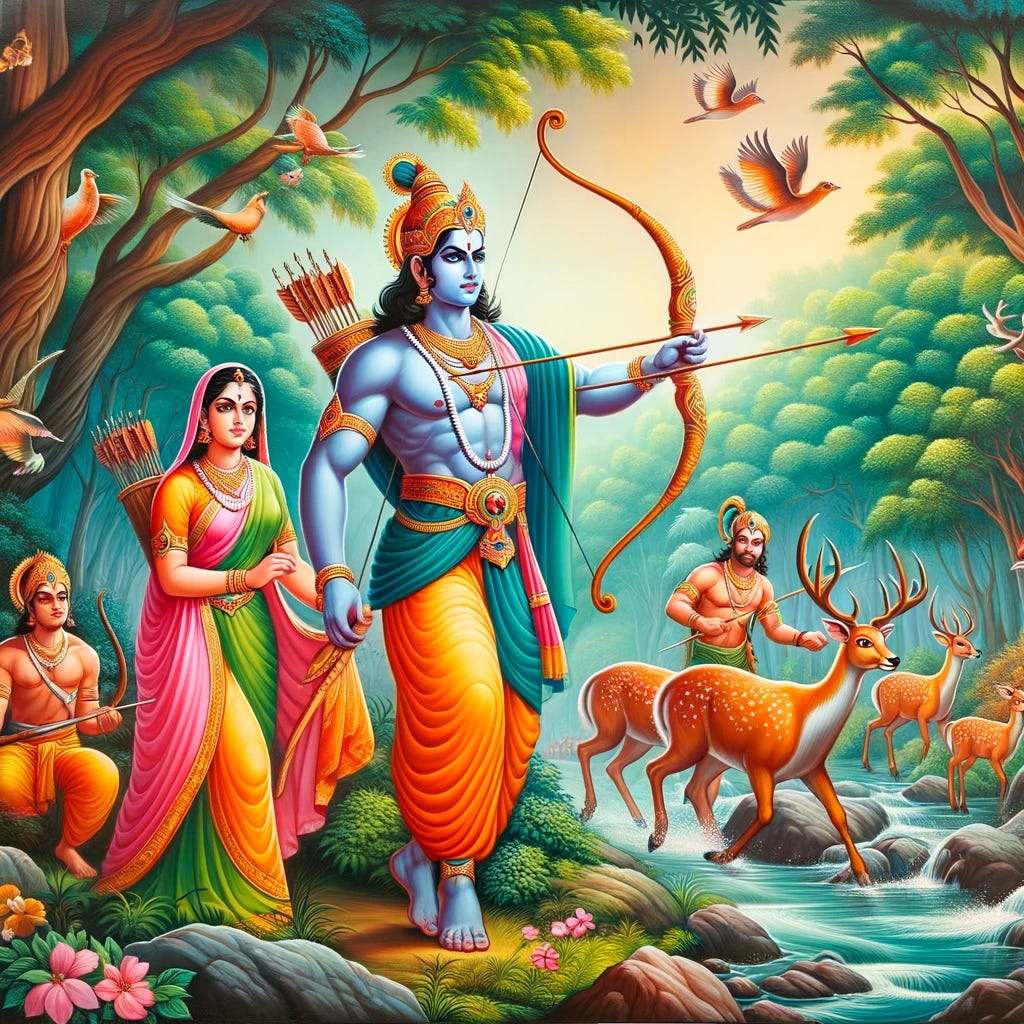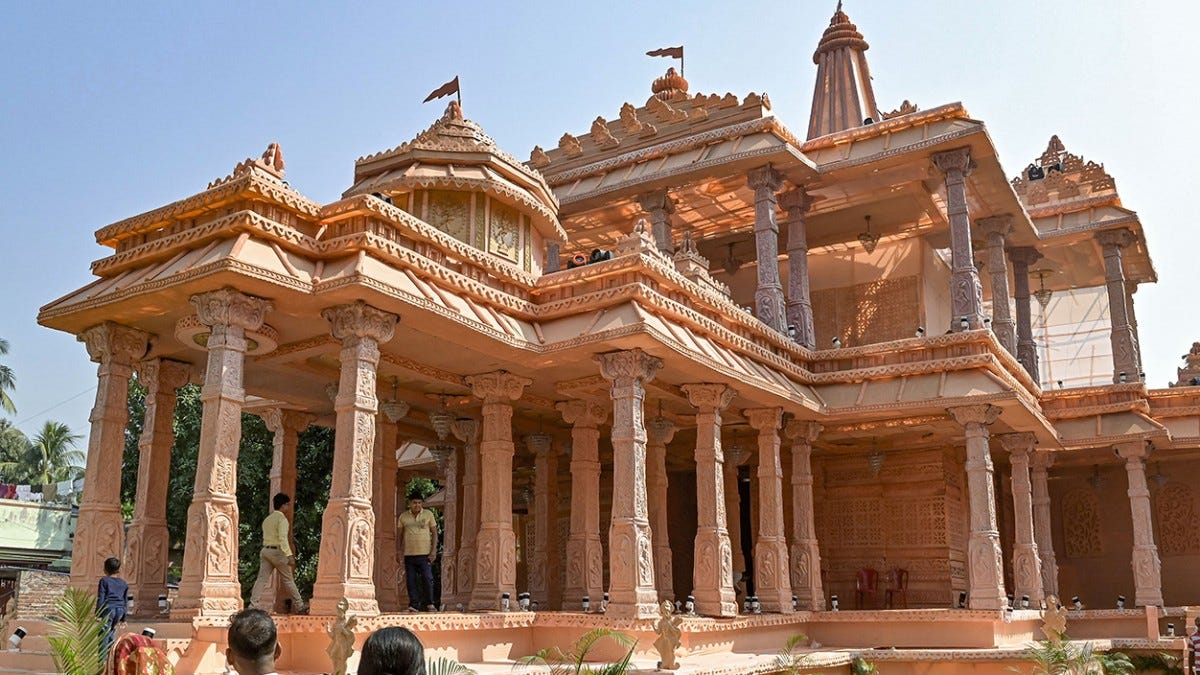1st January, 2024: Lord Ram in Bhagat Kabir's Verses in Sri Guru Granth Sahib
"The KBS Chronicle" wishes its readers and subscribers a very happy and prosperous New Year 2024.
Ram Janmabhoomi Temple at Ayodhya and the Universality of “Ram”
As the first second of 2024 ticks in and we extend heartiest and heartfelt New Year wishes to all our readers and subscribers, the divine vibrations of the imminent arrival of Sri Ram seem to permeate the cosmos. The world stands on the cusp of a once-in-a-millennium event—the inauguration of the Ram Janmabhoomi Temple in Ayodhya on January 22, 2024—signifying a profound moment for worshippers, devotees, and admirers of Lord Ram, revered as an avatar of Lord Vishnu. In the Indian spiritual ethos, Lord Ram's persona embodies righteousness, moral integrity, and the virtues of an ideal ruler, a 'Maryada Purushottam,' heralding an era of ideal society and governance known as "Ram Rajya."
Notably, in the verses of the Sri Guru Granth Sahib (SGGS), including those penned by Bhagat Kabir, 'Ram' is often referred to synonymously with the omnipresent, omniscient, and all-powerful God. This usage transcends specific religious narratives, embracing a universal understanding of the Divine as the singular pervasive truth underlying all existence. As we celebrate the new year 2024 and also approach this historic event, let us delve into how Bhagat Kabir's verses encapsulate this universal and inclusive vision of the Divine, reflecting the profound spiritual syncretism that has characterized the Indian spiritual tradition since time immemorial, in which Lord Ram has been a central figure.
Bhagat Kabir’s Verses on Lord Ram
The verses from Ang 1158 of the Sri Guru Granth Sahib (SGGS) are imbued with profound spiritual significance. Composed by Bhagat Kabir, a revered saint whose hymns are an integral part of this holiest Sikh scripture—regarded and venerated by the Sikhs as a living embodiment of the Guru—these lines illuminate the essence of devotion and highlight the futility of mere ritualistic practices in the absence of true understanding and love for the Divine. Known for his mystical poetry and teachings, Bhagat Kabir emphasizes the inner spiritual path over external religious symbols and rituals, guiding devotees towards a more personal and direct experience of the divine.
For those who do not know Punjabi/ Gurmukhi, a video at the end, guides you through these priceless verses.
Ceremonial Symbols and True Devotion (ਮਾਥੇ ਤਿਲਕੁ ਹਥਿ ਮਾਲਾ ਬਾਨਾਂ): Bhagat Kabir speaks of people adorning themselves with religious symbols like the ceremonial mark on the forehead, malas (prayer beads) in their hands, and wearing religious robes as a display of piety. He critiques these external practices and ostentatious rituals by suggesting that true devotion lies not in these symbols but in a sincere connection with the Divine. The symbols in themselves are not condemned but highlighted as insufficient without the inner love and realization of God.
Perception of God as a Plaything (ਲੋਗਨ ਰਾਮੁ ਖਿਲਉਨਾ ਜਾਨਾਂ): This line reflects on how some people trivialize the concept of God, treating the divine as a mere plaything— even a toy— or a superficial entity to engage with only in times of need or for their amusement. Kabir Ji points out the shallow understanding of the divine nature and urges a deeper, more reverential approach to spirituality.
Personal Declaration of Devotion (ਜਉ ਹਉ ਬਉਰਾ ਤਉ ਰਾਮ ਤੋਰਾ): Kabir Ji expresses a profound sense of belonging to the Almighty, even if it means being perceived as insane by the world. This line indicates an intense and direct personal relationship with the divine, where societal norms and judgments hold no value in comparison to the love and surrender to God.
The Incomprehensibility of the Mystic's Path (ਲੋਗੁ ਮਰਮੁ ਕਹ ਜਾਨੈ ਮੋਰਾ): Here, Kabir Ji speaks about the secret of his spiritual path and devotion, which is not easily understood by others. The mystic's way is often beyond conventional understanding, and Bhagat Kabir implies that only those who tread the path know its true essence.
Rejection of Ritualistic Worship (ਤੋਰਉ ਨ ਪਾਤੀ ਪੂਜਉ ਨ ਦੇਵਾ): Kabir Ji rejects the practice of picking leaves for offerings or worshipping idols, emphasizing that without true devotion, such acts are futile. He stresses the importance of heartfelt devotion to the Almighty God, over symbolic rituals.
The Futility of Service Without Devotion (ਰਾਮ ਭਗਤਿ ਬਿਨੁ ਨਿਹਫਲ ਸੇਵਾ): Here, Kabir Ji asserts that any service or religious act devoid of devotion to Ram (God) is useless. The essence lies in the love and devotion behind the act, not the act itself.
Worship of the True Guru (ਸਤਿਗੁਰੁ ਪੂਜਉ ਸਦਾ ਸਦਾ ਮਨਾਵਉ): Kabir Ji expresses his devotion to the True Guru, indicating continuous worship and surrender to the one who leads him to the truth. The True Guru is revered as a guide to divine knowledge and realization.
Peace in Divine Service (ਐਸੀ ਸੇਵ ਦਰਗਹ ਸੁਖੁ ਪਾਵਉ): The service that is imbued with love and devotion brings peace in the divine court. Kabir Ji identifies this as the true service that leads to spiritual fulfillment.
Public Perception and Divine Understanding (ਲੋਗੁ ਕਹੈ ਕਬੀਰੁ ਬਉਰਾਨਾ): Despite being deemed insane by people, Kabir Ji is content in his spiritual madness. He implies that while the world may not understand his devotion, it is recognized and cherished by the Divine.
The Secret Known Only to the Divine (ਕਬੀਰ ਕਾ ਮਰਮੁ ਰਾਮ ਪਹਿਚਾਨਾਂ): Ultimately, Kabir Ji concludes that his mystical experience and the depth of his devotion are known truly only to the Divine. The divine alone understands and appreciates the essence of his devotion.
In summary, these verses from Bhagat Kabir in Sri Guru Granth Sahib encapsulate a profound critique of superficial religious practices and emphasize a deep, personal, and sincere approach to spirituality. Kabir's ‘bani’ is characterized by its straightforwardness and focus on a direct, heartfelt connection with the Divine, bypassing ritualistic and outward displays of piety. Through these verses, he encourages seekers to look beyond the external and focus on the inner journey of love, devotion, and understanding.
Concluding: The Universality of Lord Ram
The beauty of Bhagat Kabir's verses from the Sri Guru Granth Sahib is their universal appeal, regardless of how one views Lord Ram—be it as the revered Prince of Ayodhya, an avatar of Lord Vishnu, or, more profoundly, another name for Akal Purakh, the omniscient God. These verses resonate with seekers and devotees alike because they touch upon the core of human spiritual quest—the search for truth and the ultimate reality. As we step into the new year 2024 and prepare for the the inauguration of the Ram Janmabhoomi Temple and reflect on the teachings of Kabir Ji, we are reminded that while paths may vary, the destination of all spiritual journeys is the same ultimate truth and reality. May the year ahead be marked by harmony and peace, free from strife and war. And may Lord Ram, in all his manifestations, shower his blessings on humankind, guiding us towards unity, compassion, and understanding as we commemorate the consecration of the Ram Janmabhoomi Temple at Ayodhya.
जय श्री राम [
जय सिया राम [








Excellent piece, dear KBS. Saint Kabir has been prolific in invoking Ram in his bani, which is full of wisdom. Each of his Shahbads in SGGS has the same message, of universality , equality and spirituality, but presented with dexterous variance of examples and arguments. ‘Logan Ram Khilauna Jana’, is, in addition, a very bold statement, which in current times may invite censor (by the very same people who use the ‘Name’- in terms of Guru’s equivalence of Name and Ram, the Almighty, to exploit the sincere seekers of Him). Strange, but so common, most of the tension between peoples is in the name of different interpretations of the True Name. Sant Kabir’s Ram doesn’t have to be confined to a particular temple, nor does He need State’s protection for that. Kya Kashi kya usar Magahar, Ram (h)riday jau hoi.
May Waheguru bestow good sense on the humanity to live peacefully, which is possible if we could differentiate between Need and Greed.